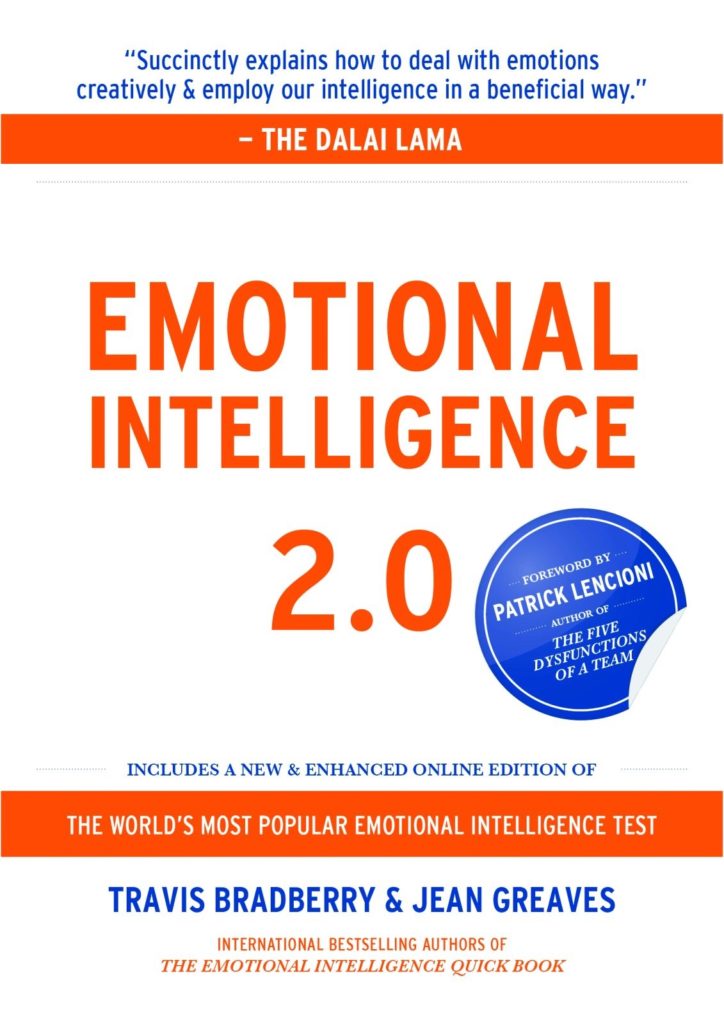Emotional Intelligence 2.0 is written by Travis Bradberry and Jean Greaves. I am thankful to my friend for recommending this book.

Emotional intelligence has become a tiresome topic in recent years. It has lost a lot of its appeal over the years since being popularised by the widely acclaimed book Emotional Intelligence by Daniel Coleman in 1995. I think that much of the frustration or avoidance of the topic centres around the question: what concrete steps could one take to develop one’s emotional intelligence?
Whether EI is scientifically sound (of which I am not an expert), a beautiful theory needs to find practical usage to demonstrate its benefit. This book prescribes strategies you can practice to improve your emotional intelligence, using the four core emotional quotient skills: self-awareness, self-management, social awareness, and relationship management.
I share these strategies from the book with you here. To work out how to approach each of them, which areas are for you, what steps to take, and so on, these are very reader-specific. You will have to read the book, ponder, reflect, seek feedback from others and devise plans for yourself to follow through. The book itself is very easy to read. Its value completely depends on what the reader does with the content.
Self-awareness strategies
- Quit treating your feelings as good or bad
- Observe the ripple effect from your emotions
- Lean into your discomfort
- Feel your emotions physically
- Know who and what pushes your buttons
- Watch yourself like a hawk…
- Keep a journal about your emotions
- Don’t be fooled by a bad mood
- Don’t be fooled by a good mood, either
- Stop and ask yourself why you do the things you do
- Visit your values
- Check yourself
- Spot your emotions in books, movies, and music
- Seek feedback
- Get to know yourself under stress
Self-management strategies
- Breathe right
- Create an emotion vs reason list
- Make your goals public
- Count to ten
- Sleep on it
- Talk to a skilled self-manager
- Smile and laugh more
- Set aside some time in your day for problem solving
- Take control of your self-talk
- Visualise yourself succeeding
- Clean up your sleep hygiene
- Focus your attention on your freedoms, rather than your limitations
- Stay synchronized
- Speak to someone who is not emotionally invested in your problem
- Learn a valuable lesson from everyone your encounter
- Put a mental recharge into your schedule
- Accept that change is just around the corner
Social awareness strategies
- Greet people by name
- Watch body language
- Make timing everything
- Develop a back-pocket question
- Don’t take notes at meetings
- Plan ahead for social gatherings
- Clear away the clutter
- Live in the moment
- Go on a 15-minute tour
- Watch EQ at the movies
- Practice the art of listening
- Go people watching
- Understand the rules of the culture game
- Test for accuracy
- Step into their shoes
- Seek the whole picture
- Catch the mood of the room
Relationship management strategies
- Be open and be curious
- Enhance your natural communication style
- Avoid giving mixed signals
- Remember the little things that pack a punch
- Take feedback well
- Build trust
- Have an “open-door” policy
- Only get mad on purpose
- Don’t avoid the inevitable
- Acknowledge the other person’s feelings
- Complement the person’s emotions or situation
- When you care, show it
- Explain your decisions, don’t just make them
- Make your feedback direct and constructive
- Align your intention with your impact
- Offer a “fix-it” statement during a broken conversation
- Tackle a tough conversation